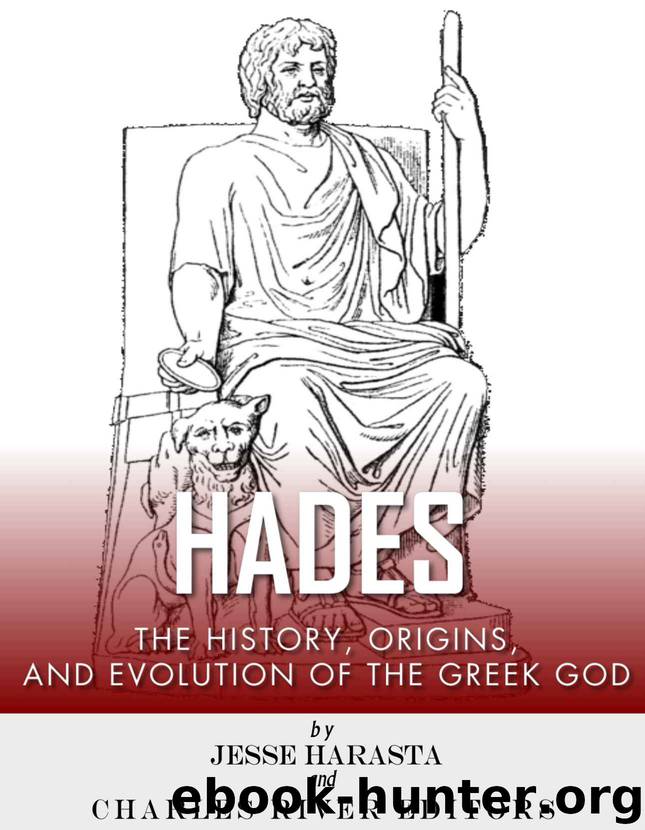Hades: The History, Origins and Evolution of the Greek God by Charles River Editors & Jesse Harasta

Author:Charles River Editors & Jesse Harasta [Harasta, Jesse]
Language: eng
Format: azw3
Publisher: Charles River Editors
Published: 2013-07-15T04:00:00+00:00
Chapter 3: Evolution of the God
“The lord of boundless revenues,
Salute not him as happy: no,
Call him the happy, who can use
The bounty that the gods bestow,
Can bear the load of poverty,
And tremble not at death, but sin:
No recreant he when called to die
In cause of country or of kin.” - Except from Horace's "Secular Hymn" (circa 17 BCE)[9]
No religious belief is a stable, unchanging system. Religious beliefs and practices evolve over time as they are applied to new contexts and as the cultures of the believers inevitably change. This is true of Hades as much as any other god or belief, especially in regard to the adaptation of the concept of "Hades" within the Latin-speaking Roman Empire and the ways that Romans, especially the poet Virgil, reinterpreted the god.
The Greeks had a belief that the polytheistic pantheons of their neighbors were basically echoes of their own, with the same gods taking different names and faces. Thus, as the Greeks expanded, they found parallel "Hades” deities in many other lands. For instance, the Egyptian god Serapis and the Persian immortal Yima were both seen as other manifestations of the death god. But of course, the most important of these foreign gods, and the one that influenced Hades the most, was the Roman god Pluto. The Romans were great admirers of the Greeks and merged their indigenous pantheon with that of the Greeks, adopting the mythology of the Greek world almost entirely. This process was known as the Interpretio Graeca, the "Interpretation of the Greeks." Thus, Zeus became Jupiter, Hera was to be Juno, and Hades became Pluto. More than the others, Pluto's name has a direct connection to one of his Greek predecessor's titles, "Plouton," "Lord of Riches." The Romans also called him "Dis," (meaning "rich"), "Dis Pater" ("father of riches") or Orcus. The name "Orcus" may come from the Greek demon Horkus, who was a dark god of oaths (also something associated with both Hades and Zeus). Both Orcus and Horkus would remain around even after the end of Mediterranean Paganism as feared demons.
Download
This site does not store any files on its server. We only index and link to content provided by other sites. Please contact the content providers to delete copyright contents if any and email us, we'll remove relevant links or contents immediately.
| Africa | Americas |
| Arctic & Antarctica | Asia |
| Australia & Oceania | Europe |
| Middle East | Russia |
| United States | World |
| Ancient Civilizations | Military |
| Historical Study & Educational Resources |
The Daily Stoic by Holiday Ryan & Hanselman Stephen(3301)
The Fate of Rome: Climate, Disease, and the End of an Empire (The Princeton History of the Ancient World) by Kyle Harper(3055)
People of the Earth: An Introduction to World Prehistory by Dr. Brian Fagan & Nadia Durrani(2733)
Ancient Worlds by Michael Scott(2682)
Babylon's Ark by Lawrence Anthony(2673)
The Daily Stoic by Ryan Holiday & Stephen Hanselman(2569)
Foreign Devils on the Silk Road: The Search for the Lost Treasures of Central Asia by Peter Hopkirk(2459)
India's Ancient Past by R.S. Sharma(2451)
MOSES THE EGYPTIAN by Jan Assmann(2412)
The Complete Dead Sea Scrolls in English (7th Edition) (Penguin Classics) by Geza Vermes(2277)
The Earth Chronicles Handbook by Zecharia Sitchin(2227)
Lost Technologies of Ancient Egypt by Christopher Dunn(2223)
24 Hours in Ancient Rome by Philip Matyszak(2078)
Alexander the Great by Philip Freeman(2064)
Aztec by Gary Jennings(2022)
The Nine Waves of Creation by Carl Johan Calleman(1915)
Curse Tablets and Binding Spells from the Ancient World by Gager John G.;(1860)
Before Atlantis by Frank Joseph(1849)
Earthmare: The Lost Book of Wars by Cergat(1824)
